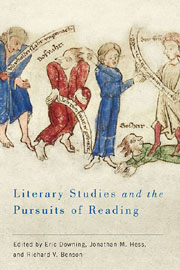Book contents
- Frontmatter
- Contents
- List of Illustrations
- Introduction
- Part I Medieval and Early Modern Practices of Reading
- 1 Apertio Libri: Codex and Conversion
- 2 The Question of Reading and the Medieval Book: Reception and Manuscript Variation of Thomasin's Welscher Gast
- 3 Reading in Nuremberg's Fifteenth-Century Carnival Plays
- 4 Shakespeare, Biblical Interpretation, and the Elusiveness of Meaning
- Part II Reading, Secularization, and Transcendence in the Long Nineteenth Century
- Part III Theories and Practices of Reading in the Twentieth Century and Beyond
- Part IV Postscript: The Ends of Reading
- Works Cited
- Notes on the Contributors
- Index
1 - Apertio Libri: Codex and Conversion
from Part I - Medieval and Early Modern Practices of Reading
Published online by Cambridge University Press: 05 February 2013
- Frontmatter
- Contents
- List of Illustrations
- Introduction
- Part I Medieval and Early Modern Practices of Reading
- 1 Apertio Libri: Codex and Conversion
- 2 The Question of Reading and the Medieval Book: Reception and Manuscript Variation of Thomasin's Welscher Gast
- 3 Reading in Nuremberg's Fifteenth-Century Carnival Plays
- 4 Shakespeare, Biblical Interpretation, and the Elusiveness of Meaning
- Part II Reading, Secularization, and Transcendence in the Long Nineteenth Century
- Part III Theories and Practices of Reading in the Twentieth Century and Beyond
- Part IV Postscript: The Ends of Reading
- Works Cited
- Notes on the Contributors
- Index
Summary
Introduction
In his discussion in the Theodicy “of the dispensation of the means and circumstances contributing to salvation and to damnation,” Leibniz is confronted with a problem: the Bible seems to suggest that God directly influences the will of some humans such as the pharaoh, whose heart he hardened. In this way, God “inspires men with a kind of anti-grace” (178; § 99). Since this would contradict the theological premise that God's “goodness makes him contribute the least possible to that which can render men guilty, and the most possible to that which serves to save them” (169; § 85), Leibniz resorts to the somewhat questionable argument that “it all often comes down to circumstances, which form a part of the combination of things” (178; § 100) in which God permits humans to be placed. Leibniz continues by citing a series of examples of such “small circumstances serving to convert or to pervert.” Since this series maps out the historical and thematic scope of my essay, I will quote much of this lengthy passage:
Nothing is more widely known than the Tolle, lege [pick up and read] cry which St. Augustine heard in a neighboring house, when he was pondering on what side he should take among the Christians divided into sects, and saying to himself,
Quod vitae sectabor iter?[What path in life shall I follow?]
- Type
- Chapter
- Information
- Literary Studies and the Pursuits of Reading , pp. 17 - 39Publisher: Boydell & BrewerPrint publication year: 2012

